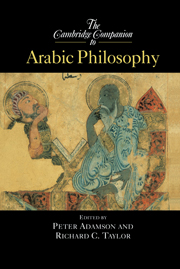Book contents
- Frontmatter
- 1 Introduction
- 2 Greek into Arabic
- 3 Al-Kindī and the reception of Greek philosophy
- 4 Al-Fāarābī and the philosophical curriculum
- 5 The Ismāīlīs
- 6 Avicenna and the Avicennian Tradition
- 7 Al-Ghazālī
- 8 Philosophy in Andalusia
- 9 Averroes
- 10 Suhrawardī and Illuminationism
- 11 Mysticism and philosophy
- 12 Logic
- 13 Ethical and political philosophy
- 14 Natural philosophy
- 15 Psychology
- 16 Metaphysics
- 17 Islamic philosophy and Jewish philosophy
- 18 Arabic into Latin
- 19 Recent trends in Arabic and Persian philosophy
- Select bibliography and further reading
- Index
13 - Ethical and political philosophy
Published online by Cambridge University Press: 28 May 2006
- Frontmatter
- 1 Introduction
- 2 Greek into Arabic
- 3 Al-Kindī and the reception of Greek philosophy
- 4 Al-Fāarābī and the philosophical curriculum
- 5 The Ismāīlīs
- 6 Avicenna and the Avicennian Tradition
- 7 Al-Ghazālī
- 8 Philosophy in Andalusia
- 9 Averroes
- 10 Suhrawardī and Illuminationism
- 11 Mysticism and philosophy
- 12 Logic
- 13 Ethical and political philosophy
- 14 Natural philosophy
- 15 Psychology
- 16 Metaphysics
- 17 Islamic philosophy and Jewish philosophy
- 18 Arabic into Latin
- 19 Recent trends in Arabic and Persian philosophy
- Select bibliography and further reading
- Index
Summary
No one within the tradition of medieval Islamic political philosophy contests the notion that human beings are political by nature. Indeed, in a now famous passage of his Muqaddima, Ibn Khald un (1332-1406) cites a corollary of that adage - namely, “human social organization is necessary” - with approval, using it to focus on what the philosophers mean by “regime” (siyāsa), especially “political regime.” As contrasted to the way the term is understood by the jurists and theologians, the philosophers understand the “political regime” to encompass
what is incumbent upon each of the inhabitants of the social organization with respect to his soul and moral habits so that they may entirely dispense with judges. They call the social organization that obtains what is required “the virtuous city” and the rules observed with respect to that “the political regime.” They are not intent upon the regime that the inhabitants of the community set down through statutes for the common interests, for this is something else. This virtuous city is rare according to them and unlikely to occur. They speak about it only as a postulate and an assumption.'
- Type
- Chapter
- Information
- The Cambridge Companion to Arabic Philosophy , pp. 266 - 286Publisher: Cambridge University PressPrint publication year: 2004

